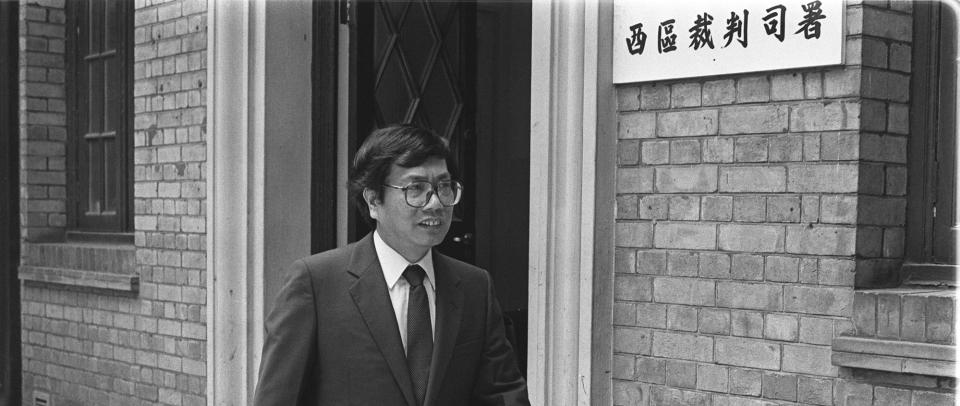The Goldfinger film director says greed, financial illiteracy expose Hongkongers to scams
The Goldfinger, Hong Kong's latest box-office hit starring Tony Leung and Andy Lau, is based on a 1983 case that is still one of the city's biggest financial frauds. But it rings true even today as Hongkongers keep losing their hard-earned fortunes to scams and deceptions in their pursuit of quick riches.
The film, which was released at the end of last year, chronicles the bankrupt Carrian group under George Tan Soon-gin, which collapsed in a web of corruption and murder and inflicted severe losses on stock investors and banks.
The breadth and complexity of that crime has not diminished with passing time, and scams continue to snare fresh victims. Deception cases surged 43 per cent in 2023 and losses reached a record HK$9.18 billion (US$1.15 billion), official figures showed, including HK$5.9 billion involving investment scams.
Do you have questions about the biggest topics and trends from around the world? Get the answers with SCMP Knowledge, our new platform of curated content with explainers, FAQs, analyses and infographics brought to you by our award-winning team.
The Goldfinger's director and screenwriter Felix Chong Man-keung, who knew people involved in the Carrian scandal, shared his thoughts with the Post about his film and how the Carrian episode compares with today's sophisticated scams.

Felix Chong, pictured in September 2018, who directed the Cantonese blockbuster "The Goldfinger". Photo: Edmond So alt=Felix Chong, pictured in September 2018, who directed the Cantonese blockbuster "The Goldfinger". Photo: Edmond So>
What made you come up with a film based on this fraud?
I was surrounded by this kind of financial news since I was a child in the 1970s. Even then, I noticed how some people were able to become rich overnight through the stock market, only to later be burdened with huge debts.
As some of my friends' family members who worked for the Carrian Group ran away when the scandal took place, it piqued my interest in this scandalous episode of Hong Kong's financial history.
Tell us more about your filmmaking thought process?
Hong Kong is a city that allows capital to flow in and out freely, like a Colosseum where financially literate people engage in the game of money. During this process, it is easy for some people to cross a line and become involved in illegal activities when they are driven by the pursuit of profits.

Hong Kong's top actors Tony Leung Chiu-wai and Andy Lau Tak-wah in a still from "The Goldfinger". Photo: Handout alt=Hong Kong's top actors Tony Leung Chiu-wai and Andy Lau Tak-wah in a still from "The Goldfinger". Photo: Handout>
While filming, I felt that the Carrian case, or the film, actually reflects the core values of Hong Kong, even though I did not initially intend for it to do so. Many Hongkongers are solely focused on pursuing profits, and I'm not here to judge this value system. It's a key part of what has made Hong Kong successful, but sometimes this could be the origin of some tragedy stories.
Does the Carrian saga expose Hong Kong's vulnerability?
In terms of financial literacy, the plot in the Carrian case is relatively simple by today's standards. This simplicity allows the public to easily understand the story. Many of my friends in the finance industry told me that financial literacy in the US is much more advanced than in Hong Kong.
Should regulators introduce more laws to tackle the scourge?
Hong Kong has tightened rules and regulations aimed at combating new types of financial fraud and scams over the past few decades. However, fraudsters often seem to be a step ahead, as they have larger incentives and are willing to risk their lives for their crimes.
Had the Carrian saga not coincided with a financial crisis and stock market collapse, the group's chairman [Tan] would have escaped unscathed. [Tan, the mastermind behind the Carrian Group, was convicted of conspiracy to defraud and sentenced to three years' imprisonment in 1996.]
While making the film, we were surprised that the chairman had already begun preparing to invest in China's property market in the 1980s, well before the country's real estate boom took off.

George Tan was convicted for defrauding creditors and sentenced to a three-year prison term in 1996. Photo: SCMP alt=George Tan was convicted for defrauding creditors and sentenced to a three-year prison term in 1996. Photo: SCMP>
Will cyber financial scams be among your future projects?
I am considering it. It is indeed very difficult to effectively depict complex financial scams and tactics on film. It's not easy to visualise these intricate manoeuvres such as a stock rights issue that resonate with film-goers in an engaging and comprehensive way on the big screen.
Translating these types of white-collar crimes into a visual medium poses significant challenges for filmmakers.
This article originally appeared in the South China Morning Post (SCMP), the most authoritative voice reporting on China and Asia for more than a century. For more SCMP stories, please explore the SCMP app or visit the SCMP's Facebook and Twitter pages. Copyright © 2024 South China Morning Post Publishers Ltd. All rights reserved.
Copyright (c) 2024. South China Morning Post Publishers Ltd. All rights reserved.